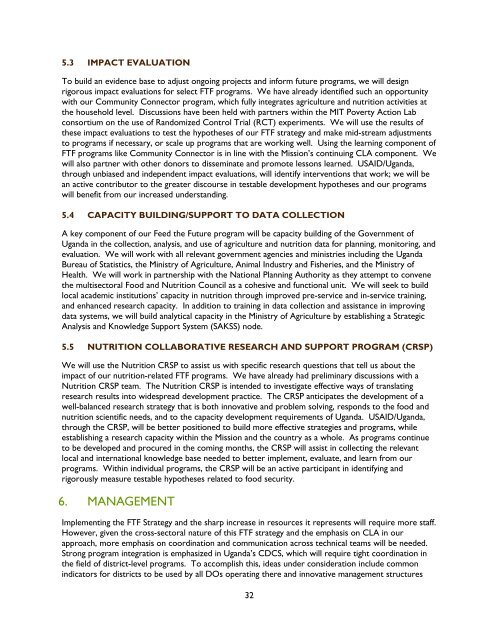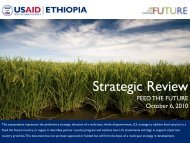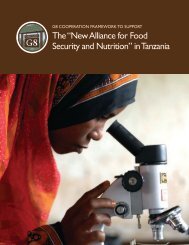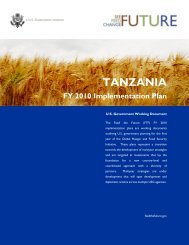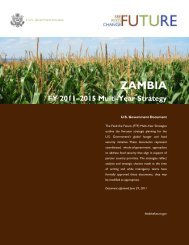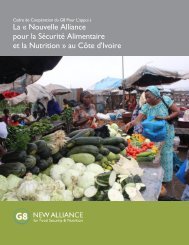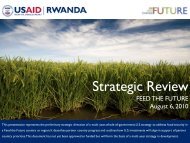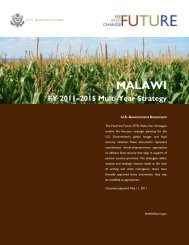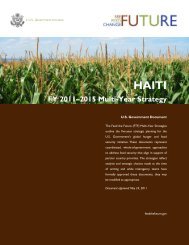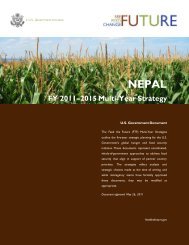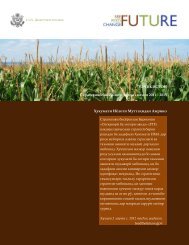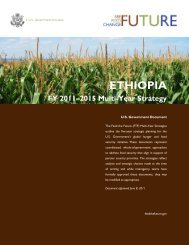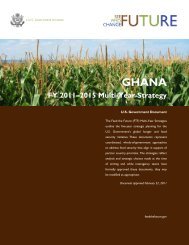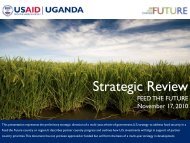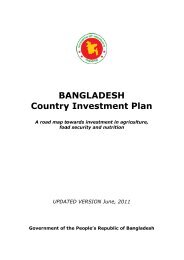Feed the Future Multi-Year Strategy, Uganda, Public
Feed the Future Multi-Year Strategy, Uganda, Public
Feed the Future Multi-Year Strategy, Uganda, Public
You also want an ePaper? Increase the reach of your titles
YUMPU automatically turns print PDFs into web optimized ePapers that Google loves.
5.3 IMPACT EVALUATION<br />
To build an evidence base to adjust ongoing projects and inform future programs, we will design<br />
rigorous impact evaluations for select FTF programs. We have already identified such an opportunity<br />
with our Community Connector program, which fully integrates agriculture and nutrition activities at<br />
<strong>the</strong> household level. Discussions have been held with partners within <strong>the</strong> MIT Poverty Action Lab<br />
consortium on <strong>the</strong> use of Randomized Control Trial (RCT) experiments. We will use <strong>the</strong> results of<br />
<strong>the</strong>se impact evaluations to test <strong>the</strong> hypo<strong>the</strong>ses of our FTF strategy and make mid-stream adjustments<br />
to programs if necessary, or scale up programs that are working well. Using <strong>the</strong> learning component of<br />
FTF programs like Community Connector is in line with <strong>the</strong> Mission’s continuing CLA component. We<br />
will also partner with o<strong>the</strong>r donors to disseminate and promote lessons learned. USAID/<strong>Uganda</strong>,<br />
through unbiased and independent impact evaluations, will identify interventions that work; we will be<br />
an active contributor to <strong>the</strong> greater discourse in testable development hypo<strong>the</strong>ses and our programs<br />
will benefit from our increased understanding.<br />
5.4 CAPACITY BUILDING/SUPPORT TO DATA COLLECTION<br />
A key component of our <strong>Feed</strong> <strong>the</strong> <strong>Future</strong> program will be capacity building of <strong>the</strong> Government of<br />
<strong>Uganda</strong> in <strong>the</strong> collection, analysis, and use of agriculture and nutrition data for planning, monitoring, and<br />
evaluation. We will work with all relevant government agencies and ministries including <strong>the</strong> <strong>Uganda</strong><br />
Bureau of Statistics, <strong>the</strong> Ministry of Agriculture, Animal Industry and Fisheries, and <strong>the</strong> Ministry of<br />
Health. We will work in partnership with <strong>the</strong> National Planning Authority as <strong>the</strong>y attempt to convene<br />
<strong>the</strong> multisectoral Food and Nutrition Council as a cohesive and functional unit. We will seek to build<br />
local academic institutions’ capacity in nutrition through improved pre-service and in-service training,<br />
and enhanced research capacity. In addition to training in data collection and assistance in improving<br />
data systems, we will build analytical capacity in <strong>the</strong> Ministry of Agriculture by establishing a Strategic<br />
Analysis and Knowledge Support System (SAKSS) node.<br />
5.5 NUTRITION COLLABORATIVE RESEARCH AND SUPPORT PROGRAM (CRSP)<br />
We will use <strong>the</strong> Nutrition CRSP to assist us with specific research questions that tell us about <strong>the</strong><br />
impact of our nutrition-related FTF programs. We have already had preliminary discussions with a<br />
Nutrition CRSP team. The Nutrition CRSP is intended to investigate effective ways of translating<br />
research results into widespread development practice. The CRSP anticipates <strong>the</strong> development of a<br />
well-balanced research strategy that is both innovative and problem solving, responds to <strong>the</strong> food and<br />
nutrition scientific needs, and to <strong>the</strong> capacity development requirements of <strong>Uganda</strong>. USAID/<strong>Uganda</strong>,<br />
through <strong>the</strong> CRSP, will be better positioned to build more effective strategies and programs, while<br />
establishing a research capacity within <strong>the</strong> Mission and <strong>the</strong> country as a whole. As programs continue<br />
to be developed and procured in <strong>the</strong> coming months, <strong>the</strong> CRSP will assist in collecting <strong>the</strong> relevant<br />
local and international knowledge base needed to better implement, evaluate, and learn from our<br />
programs. Within individual programs, <strong>the</strong> CRSP will be an active participant in identifying and<br />
rigorously measure testable hypo<strong>the</strong>ses related to food security.<br />
6. MANAGEMENT<br />
Implementing <strong>the</strong> FTF <strong>Strategy</strong> and <strong>the</strong> sharp increase in resources it represents will require more staff.<br />
However, given <strong>the</strong> cross-sectoral nature of this FTF strategy and <strong>the</strong> emphasis on CLA in our<br />
approach, more emphasis on coordination and communication across technical teams will be needed.<br />
Strong program integration is emphasized in <strong>Uganda</strong>’s CDCS, which will require tight coordination in<br />
<strong>the</strong> field of district-level programs. To accomplish this, ideas under consideration include common<br />
indicators for districts to be used by all DOs operating <strong>the</strong>re and innovative management structures<br />
32


